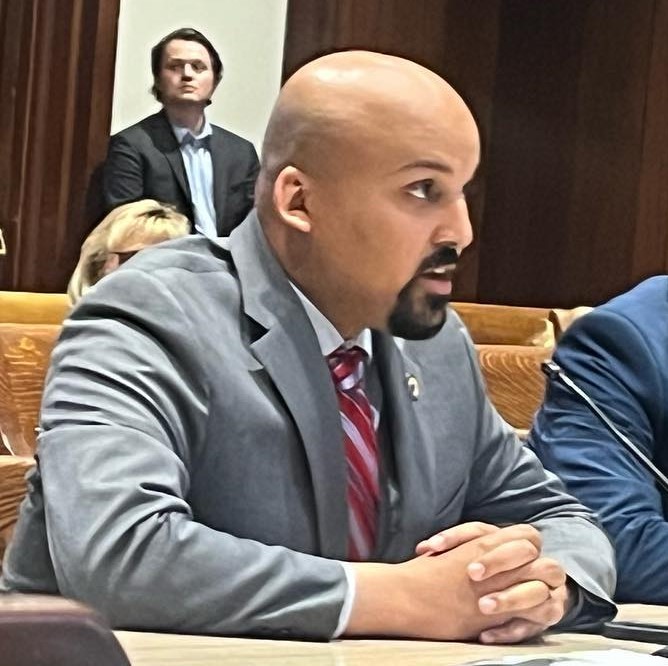By: Senator Pavel Payano, 7-23
 For nearly a century, legacy preferences have played a significant role in American college and university admissions, granting preferential treatment to the children of alumni. These policies were established in the 1920s, coinciding with an influx of Jewish applicants to top schools.
For nearly a century, legacy preferences have played a significant role in American college and university admissions, granting preferential treatment to the children of alumni. These policies were established in the 1920s, coinciding with an influx of Jewish applicants to top schools.
However, legacy preferences have been widely criticized as anti-meritocratic, inhibiting social mobility, and perpetuating a de facto class system. Moreover, donor preference, exemplified by the Varsity Blues scandal, further exacerbates inequities in college admissions.
This article examines the history and flaws of legacy preferences, highlights the implications of donor preference, explores the impact of early decision programs, and what is being done so that working class families of this district are given a fair opportunity in the admission process.
Legacy Preferences: An Engine of Inequity
Legacy preferences were initially introduced in the 1920s to limit the increasing numbers of Jewish and Catholic students gaining admission to prestigious universities. At the time, elite institutions sought to maintain a predominantly Protestant student body and used legacy preferences to achieve that goal. Over time, these preferences became institutionalized and were justified as a means of fostering a sense of tradition, loyalty, and community among alumni.
One of the main criticisms of legacy preferences is their conflict with one of our core American values, the principle of meritocracy.
By giving preferential treatment to applicants based on family connections rather than individual accomplishments, these policies undermine the notion that college admissions should be based on academic achievement, personal qualities, and potential.
This can create a system where students from privileged backgrounds have an unfair advantage over equally or more deserving candidates from less privileged backgrounds.
Legacy preferences have been shown to disproportionately benefit affluent students. Research has indicated that legacy applicants are more likely to be affluent and come from highly educated families.
This perpetuates socioeconomic disparities in higher education by favoring those who are already privileged. In contrast, students from low-income backgrounds or/and underrepresented minority groups face greater barriers to admission, exacerbating existing inequalities.
Legacy preferences can hinder social mobility by entrenching advantages for certain groups across generations. When admissions decisions are influenced by legacy status, it becomes more difficult for talented individuals from disadvantaged backgrounds to break the cycle of poverty and access the opportunities that higher education can provide.
This perpetuates an elite class of students who benefit from family connections rather than personal achievements.
Donor Preference and the Varsity Blues Scandal
The Varsity Blues scandal, which came to light in 2019, exposed a criminal conspiracy to influence undergraduate admissions decisions at several top American universities.
The scandal revealed how wealthy parents paid substantial sums to fraudulently inflate entrance exam scores and bribe coaches to secure admission for their children. This scandal shed light on the extent to which donor preference can distort the admissions process, favoring affluent families over more deserving students.
Donor preference perpetuates inequality by giving preferential treatment to students who may not meet the institution’s academic standards. It puts students who don’t have financial means or personal connections at a disadvantage. No matter how talented or accomplished they are, they may find themselves competing against applicants who have an unfair edge solely due to their family’s financial status or connections. This can breed frustration, disillusionment, and a sense of inequality among aspiring students. It also raises questions about the integrity of the admissions process and undermines the principles of fairness and equal opportunity.
While colleges argue that donations support financial aid programs and infrastructure development, research has shown no statistically significant evidence of a causal relationship between legacy preference policies and total alumni giving.
The existence of donor preferences opens the door to corrupt practices and unethical behavior. It can create an environment where influence and connections matter more than fairness and transparency.
As we learned from the Varsity Blue Admission Scandal, this can lead to instances of bribery, fraud, or other forms of illegal activity, as individuals may seek to exploit the system to secure admissions for themselves or their children.
Early Decision: The Pressure to Commit
Early decision programs, although not directly related to legacy preferences or donor preferences, add another layer of complexity to college admissions.
These programs require students to commit to attending a particular institution if accepted, often before they can compare financial aid offers from multiple schools.
Early decision tends to favor students from privileged backgrounds who can make binding commitments without financial concerns.
This can further exacerbate inequities in the admissions process, limiting opportunities for students from lower-income and first-generation families who may require more time and financial aid considerations.
Moving Towards Fairness and Reform
The prevalence of these preference programs has created a system that undermines fairness, equal opportunity, and meritocracy. Together and apart, these practices disproportionately favor the privileged, perpetuating socioeconomic disparities and hindering social mobility for talented individuals from disadvantaged backgrounds.
As colleges receive funds from the federal government and are expected to uphold fairness in their admissions processes, it is imperative to address these issues.
This is why I partnered with State Representative Simon Cataldo in filing H.3760/SD.2670 which will eliminate these preference programs, which perpetuate inequities and distorts the admissions process. By prioritizing merit-based admissions that evaluate an applicant’s qualifications and achievements rather than their family connections or financial contributions, we can create a more equitable and inclusive higher education system that benefits all the middle class and working-class students of the First Essex District and the Commonwealth.
If you have any questions or comments about this bill or there is something my office can assist you with do not hesitate to contact me at Pavel.Payano@masenate.gov. ◊
